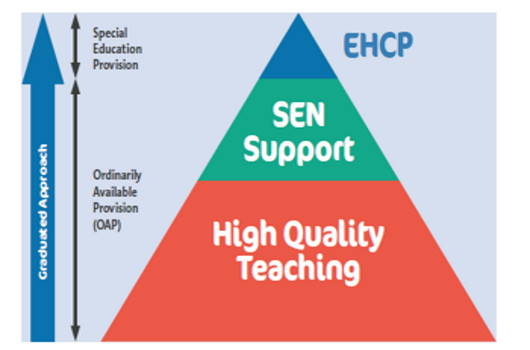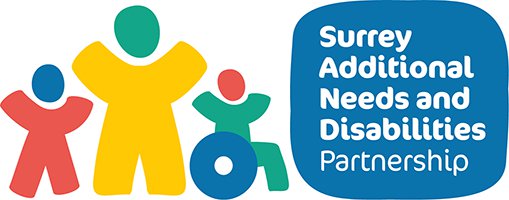Support in mainstream education
Most children with additional needs and/or disabilities are educated within a mainstream school. Schools are given funding to support learners with additional needs and must do everything they can to make sure children with SEND get the support they need to fulfil their potential.
Page contents
- Support in mainstream schools (Ordinarily Available Provision in school)
- The right to mainstream
- SEND support in mainstream schools
- Individual Support Plans
- SEND Support Arrangements
- Support above Ordinarily Available Provision
Support in mainstream schools (Ordinarily Available Provision (OAP) in school)
All children have access to Ordinarily Available Provision (OAP) in their educational setting. This includes 'High Quality Teaching' and, where needed, additional provision known as Special Educational Needs (SEN) Support.
Schools must do everything they can to make sure all children get the support they need to make progress regardless of diagnosis. They do this by delivering a range of support specific to each child's additional needs. This is provided in different ways such as, assistive technology, individual or small group teaching, or in-class support.
We have detailed guidance for schools on Ordinarily Available Provision.
A diagnosis or formal assessment is not required for this level of provision.
Watch to find out more about OAP:
Ordinarily Available Provision (OAP) includes support with learning and to make progress. This includes all teaching, resources, use of the curriculum, support from staff, enrichment activities and resources, and support to access the environment. All children and young people have access to this, and it is provided through mainstream funding and resource arrangements.
Ordinarily Available Provision is everything mainstream schools can provide through their ordinary and delegated funding. There is no additional funding or plan required for them to deliver this.
The right to mainstream
Under the Children and Families Act 2014, children and young people with SEND have a right to be educated within a mainstream school if they or their parents want.
Mainstream schools cannot refuse a child a place on the grounds that their needs or disabilities are too great or complex.
The Local Authority (Surrey County Council) can only refuse, if they can prove that a mainstream placement would not be compatible with the efficient education of others, and that there are no reasonable steps the Local Authority can take to avoid this.
Even when professionals support the Local Authority's view, parents and young people still have the right to education within a mainstream setting if this is what they want.
However, although parents and young people have a right to request mainstream education, they do not automatically have the right to a placement at a specific mainstream school or setting.
Children without Education, Health and Care (EHC) plans
Children without Education, Health and Care (EHC) plans must be educated in a mainstream school.
The only exception would be in cases where children are electively home educated (homeschooled), or where parents or carers choose to pay for their child to be educated in an independent school. Very rarely, a child without an EHC plan might be offered a placement at a special school with the prior consent of their parents, or the young person themselves if over the age of 16.
Children with Education, Health and Care (EHC) plans
Most children with an EHC plan are educated within a mainstream school or setting. For a child to be educated in a special school or a specialist centre within a mainstream school, the Local Authority (Surrey County Council) has to agree that this is the most appropriate type of provision for your child's needs.
Section F of your child's EHC plan sets out the provision that they should be receiving to meet their educational needs. This can also include therapies provided by health authorities or social care (for example, speech and language therapy).
Whether your child is being educated within a mainstream setting or a special school, your child's EHC plan is a legal document. The Local Authority (Surrey County Council) has a legal responsibility to make sure that your child is receiving the support set out in their EHC plan.
If you have questions or concerns about your child's EHC plan, you can speak to their SEND case officer. You can also speak to your child's Special Educational Needs Co-ordinator (SENCO).
SEND support in mainstream schools
Your child does not need an Education Health and Care (EHC) needs assessment to access support through their school.
However, if you or the professionals working with your child feel that their needs are more complex, or your child is making limited progress under their existing SEND support arrangements, then an EHC needs assessment might be the next step to getting the right level of support in place.
The 'Graduated Response'

For most children, implementing High Quality Teaching strategies will remove barriers to learning and enable them to progress.
Where it is decided that additional support and provision is needed for an individual, the school should apply the four-part model outlined in the SEND Code of Practice (assess, plan, do, review).
Prior support and actions to address a pupil's needs will be re-visited, reviewed, and refined so that more focused and informed provision can be put in place. These actions should help to ensure that pupils are able to make good progress and better access the school curriculum.
This approach is often referred to as a graduated response to needs and follows the assess, plan, do, review cycle:
Assess
The first step is to collect information and assess what the difficulties are, gather views and consider what professionals have been involved.
Plan
Teachers, the SENCO, the child/ young person and their family agree on what interventions are needed, how these will be put in place, what and support is needed to support reaching expected outcomes.
Do
The plan agreed in the previous step is put in place. Teaching staff are responsible for checking whether the plan is working. Where the plan is not working or new needs emerge, they will move to the review stage before the planned review date.
Review
Look at the effect of the interventions put in place on the child/ young person's progress. This should include the views of the child/ young person and their parents/ carers.
Individual Support Plans
Individual Support Plans are part of the first level of support that schools or other educational setting can put in place for a child with additional needs. They are used to record and monitor the needs and provision of the students. Sometimes these plans are known by different names such as 'Individual Education Plan' but they have the same function.
ISPs assess and record the child's needs, set out the support they have in place, monitor the child's progress and plans for ongoing support. The school or educational setting will share the ISP with any teaching staff who work with the student, so that they know what support is needed.
The school will regularly review the plan with the parent/ carer and the student (usually each term). At the review, there will be a decision on whether support needs to be changed, to continue with existing arrangements or, to close the plan, if a students need no longer it.
If the student is not making progress with the support in place and a higher level of support is needed, a school might move to using a SEND Support Arrangements document, or request an Education, Health and Care (EHC) needs assessment.
SEND Support Arrangements
SEND Support Arrangements (previously known as Pathway Plans) are a tool used to monitor and support children with additional needs and disabilities, who are being supported in school through SEND support.
It is similar to an Individual Support Plan but a more in depth and structured document and process. In many cases a child will have an Individual Support Plan in place, before progressing to SEND Support Arrangements.
The SEND Support Arrangements process follows the "Assess, Plan, Do, Review cycle".
The setting will work with the student and parent/ carer, as well as any professionals involved with the student and identify target outcomes and what additional support or intervention is needed. The student and parent/ carer will be involved with all planning and the support must be focused on the individual and considering their needs.
Children/ young people who require a higher level of support than SEND Support Arrangements can facilitate, may require an Education, Health and Care (EHC) plan.
Support above Ordinarily Available Provision
Most children and young people have their needs met and make progress with support from what is ordinarily available (Ordinarily Available Provision), but some children will need additional support above this.
A minority of children may need additional support above what is ordinarily available, this is called special education provision and is provided through an Education, Health and Care (EHC) plan, sometimes referred to as an EHCP. In Surrey in 2021/22, more than 95% of children had their needs met within ordinarily available provision and less than 5% of students needed special educational provision to be made for them through an EHC plan.
After going through the 'Assess, Plan, Do, Review cycle', if there is evidence that a child may require provision above what is ordinarily available in the school or educational setting, the parent/ carer or young person may request an Education, Health, and Care (EHC) needs assessment. This is a full investigation of the child's educational needs.
An EHC assessment might lead to a child receiving an EHC plan. This is a legal document that describes a child or young person's educational, health and social care needs, their aims for the future and how professionals will work together to support the child or young person.
You can find out more about the process on our What is an Education, Health and Care (EHC) needs assessment web page.
If the EHC assessment does not result in a child receiving an EHC plan, the Local Authority will write to the parent/ carer or young person to inform them of the decision and explain how their needs will be met without an EHC plan.
Terminology explained
Provision
Provision is the activities planned for children's education. This is the support that mainstream schools or settings should be able to provide for a child or young person through their agreed funding and resource arrangements (Ordinarily Available Provision). You may also hear the term 'Universal offer' and 'SEN Support', which are part of ordinarily available provision. This may include a variety of adaptations including reasonable changes to the physical environment, changes to teaching styles as well as levels of adult support.
>High Quality Teaching
High Quality Teaching, also known as 'Quality First Teaching (QFT)' considers the needs of learners which then informs planning and delivery to make learning accessible. This may involve teachers using a range of strategies to meet the individual child's needs.
Special Educational Provision
Special Educational Provision is provision that is different from or additional to that normally available to pupils or students of the same age. It is designed to help children and young people with additional needs and disabilities to access the National Curriculum at school or to study at college. For children under two years old it is educational provision of any kind.
